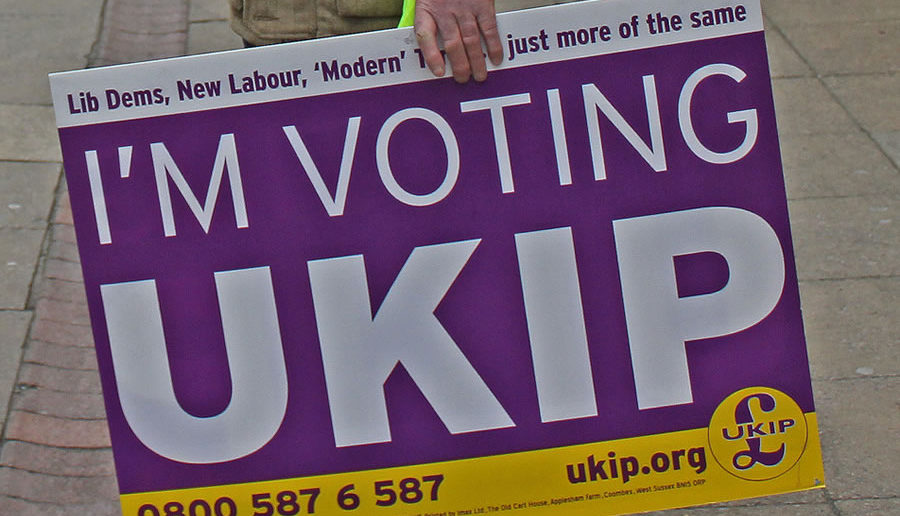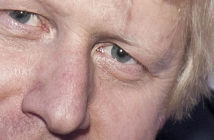After one massive by-election win and another near miss, UKIP has been handed another leg-up into mainstream politics: an invitation to participate in one of the three party leaders’ debates scheduled for the 2015 general election. Assuming the plans go ahead, Nigel Farage will take the stage with David Cameron, Ed Miliband and Nick Clegg – against whose Liberal Democrats UKIP has been polling healthily indeed.
The result of the by-election in Clacton was remarkable by any standard: to find a comparable by-election result in the record books, one has to go back to the Bermondsey by-election of 1983, in which Liberal candidate Simon Hughes took that seat from Labour on a 44% swing.
Along with the strong run that nearly saw off Labour in Heywood and Middleton, Clacton will undoubtedly give a boost to the UKIP campaign in Rochester and Strood, where Mark Reckless is bidding to become the party’s second elected MP.
And yet, there is still no reason to expect a wave of UKIP wins in 2015. In fact, the best precedent for what might happen to UKIP in 2015 might be the experience of the Social Democratic Party in the early 1980s.
Striking out
The SDP was set up in 1981 by the “Gang of Four” of former Labour ministers – Roy Jenkins, Shirley Williams, Bill Rogers and David Owen – when Labour swung hard to the left after its defeat in the 1979 general election.
A key element of the schism was over Britain’s continued membership of the Common Market, as it was then called, with the SDP leaders believing that Labour might back leaving Europe. Arguably, the split on the left over Europe in 1981 has become a split on the right over the same issue in 2014.
The SDP received enthusiastic support from the public and from much of the media shortly after it was formed and at one point in 1981 it led the other parties in voting intentions in the polls. Much as is happening now, two key by-elections gave a boost to the newly founded party. In November 1981 Shirley Williams won the Crosby by-election from the Conservatives and this was followed by a victory in March 1982 by Roy Jenkins in the Conservative held seat of Glasgow Hillhead. At its high point, the party had 30 MPs in the House of Commons, all but one of them being former Labour MPs.
However, in the 1983 general election, when Labour received its lowest vote share (27.6%) since 1918, the SDP fared much less well: the party took 11.6% of the vote, slightly below the 13.7% its Alliance partners the Liberals polled, and it ended up with only six seats. Interestingly enough, Roy Jenkins held his seat in Glasgow Hillhead, while Shirley Williams lost hers in Crosby.
The lesson of the SDP’s damp squib start is that Britain’s first-past-the-post electoral system is very unforgiving for small parties. And while UKIP has been consistently running at 14-15% in voting intentions over the last year, a similar score in the general election of next year could bring a meagre return in seats.
Think national, act local
The margin of victory in Clacton was so large that it is likely that Douglas Carswell will win the seat again in the general election. If Mark Reckless does really well in Rochester and Strood, he may well hold on to that seat in 2015; but if he achieves a narrow victory, his future will be very open to question.
Nigel Farage himself has a good prospect of winning in his chosen seat of Thanet South simply because he is so well known, but the UKIP message runs the risk of being drowned out in a general election. After all, a by-election can revolve tightly around local issues, which tend to get drowned out during general elections by the noise of a national campaign.
There are other reasons besides why small parties do less well in general elections. The nature of the “ground war” at the constituency level is very different; in a by-election an insurgent party can flood a constituency with volunteers, whereas in the general election they will be dispersed over the country as a whole.
Confounding things further, the psychology of voting in a by-election often comes down to sending the government or the national political parties a message of discontent – whereas the psychology of general election voting is about choosing a government. And that, in turn, can crowd out minor parties.
This point is immediately relevant for any other eurosceptic Conservative MPs who are unhappy with the party’s stance on Europe and are thinking about defecting to UKIP. If Mark Reckless wins by a comfortable margin in Rochester, then it would be a good idea for these backbench Conservatives to follow their colleague’s lead and stand for UKIP in a by-election right now. In this way they can take advantage of the bandwagon while it is still rolling.
If they wait for the general election to switch parties, then their chances of winning under a UKIP banner will be much reduced. If UKIP wants a realistic shot at more than a couple of seats, they’ll have to jump ship now.
Paul Whiteley receives funding from the ESRC
By Paul Whiteley, University of Essex![]()




